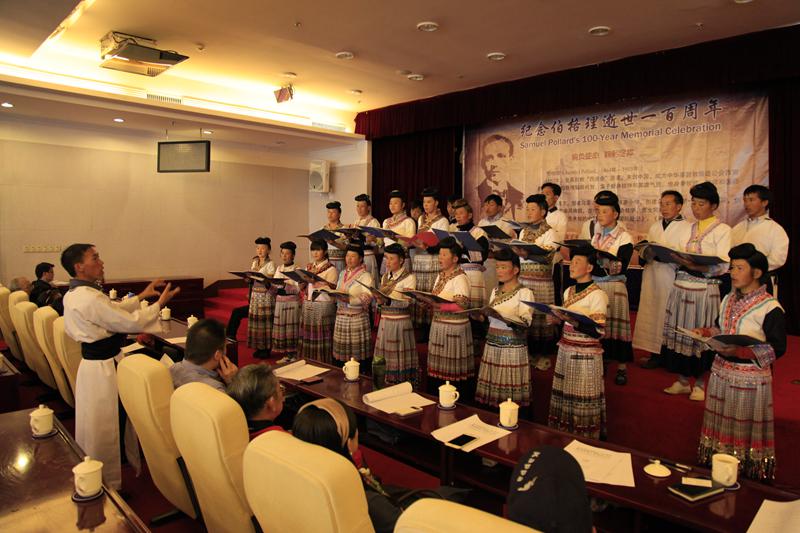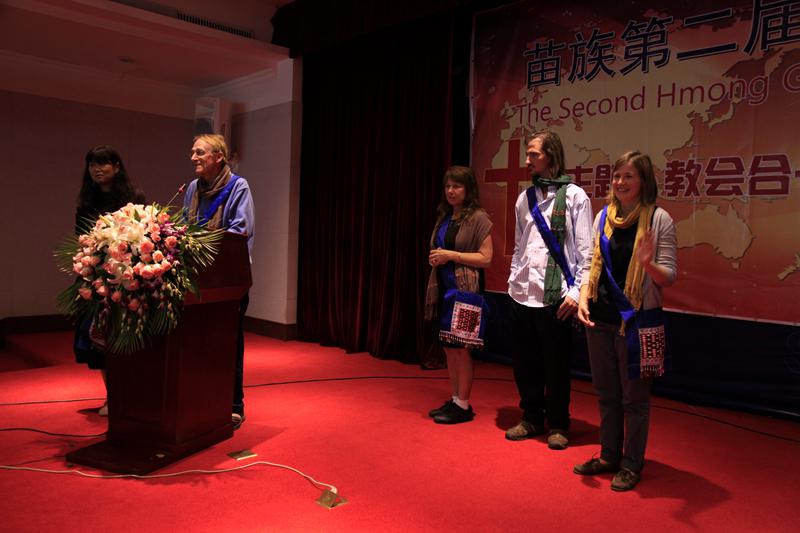A ceremony was held in Kunming, Yunnan to mark the 100th anniversary of Samuel Pollard's death on Sept. 1st, 2015. Some 100 people of Miao and Han believers from Yunnan and Guizhou who are researchers of the "Shimenkan phenomenon" attended the ceremony and commemorated this great missionary. Samuel Pollard's mission in Yunnan and Shimenkan, Guizhou was reviewed and his realistic significance, from his spirit to preaching the gospel nowadays, was discussed. His grandson and descendants also visited China for the first time and paid respects to their ancestor in Zhaotong and Shimenkan.
Samuel Pollard was born in a Christian laborer family in 1864 at Cornwall, England and had all sorts of talent when he was a child. Encouraged by the story of African missionary Stephen Lee, he was appointed a missionary and left for China in 1887. As a Methodist missionary, he named himself Bo Geli after a Confucian scripture and was posted in a Christian mission station in Zhaotong with his friend F.J.Dymond (Chinese name Tai Mulian). Most of the Chinese Confucian scholars were not willing to convert to the Christian faith and less than 17 people were baptized during Pollard's first 17 years in Zhaotong. Pollard faced depression with his surroundings during that time. The hard time he faced was buried in history and is not mentioned very often.
In 1904, God gave him an opportunity with he Big Flowery Miao. They were the descendants of the guard of Chi You in the legends and they have suffered through wars, lost their homes and lived at the bottom of the social system under the rule of Yi for over 2000 years. Four Miao people met missionary J.R. Adams by accident. Samuel Pollard knew those Miao people by a letter of introduction from Adams and he had transferred from his mission station to a poor countryside in Shimenkan since then.
Samuel Pollard created a Miao script and translated the Bible into Miao languages. He founded dozens of churches within several hundred miles of Shimenkan. In terms of education, he built the first elementary school for the Miao people in the Wumeng mountain area and expanded to about 120 schools later on. He advocated bilingual education and co-education. Meanwhile, he launched a planned campaign to gradually wipe out illiteracy to improve the Miao's education levels. To address sanitary conditions, he identified the earliest leprosies and established hospitals in the Southeast as well as buildingswimming pools and football grounds to enrich the Miao's lives. It took 11 years only for him to change Shimenkan from a remote and desolate area to a cultural highland and living paradise in Southwest China.
Unfortunately, an attack of Typhus fever broke out in Shimenkan in July, 1915. Pollard became infected while saving the patients and left the world on Sept. 15, 1915. On his tombstone were the words from John 12:24, "Unless a grain of wheat falls into the earth and dies, it remains alone; but if it dies it bears much fruit," written by Li John, who wrote traceability stele for Miao.
During the anniversary commemoration, Tao Shaohu, a professor from Yunnan association for Miao study, talked about the realistic significance of the spirit of Pollard in his speech. He praised Samuel Pollard for respecting and learning about the culture of Miao and called for all those who attended to learn from him, not only to learn the Miao culture but also to train the Miao talents and leaderships.
Li Keling, the descendant of Li John, also reviewed the stories how they were converted to the faith in Christ. Their families were the earliest to accept beliefs in the Miao people. Young and elder delegates from the Miao's church each had a speech respectively, talking about how thankful they were for the changes in religion and lives brought about bySamuel Pollard. They even said that Pollard loved the Miao all his life beyond blood relations because of Christ's love. A Miao elder, Long Guangrong, couldn't help but shed a few tears during the speech.
In late August and early September, Stephen Pollard, Samuel Pollard's grandson, with his wife Marcia and their children, Stephanie and Blake, visited China for the first time. They came to Zhaotong and Shimenkan to pay respect to their ancestors. Stephen Pollard was greatly touched by the Miao script made by his grandfather and the Christian missionary's spirit in the Miao. He prayed for the Miao believers and hoped that they will forever be with God, that their education level will improve, their economics be developed, and their spiritual to continue to grow. He said that he was grateful for this trip to meet and visit the many Miao believers.














